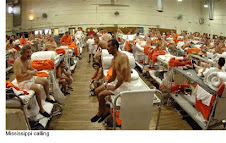The National Public Service Council To Abolish Private Prisons made a concerted effort when choosing its name to erase any possibility of ambiguity regarding who we are and our mission statement. It is our unwavering organizational belief that as long as our government permits Private Prisons For Profit to operate as legal businesses, the American Criminal Justice System, in particular, will never have the capacity to develop -in theory or otherwise- a credibility that the people of this great nation can respect and feel morally comfortable with. This is not a complicated matter. In spite of the endless assortment of political debates and the countless number of discussions among independent committees appointed to research and examine the economic pros and cons of privatization, and in spite of all the "other" arguments created by design, to distract, divide, frighten and confuse the citizens of this country and prevent them from using humane common sense, one cannot ignore or pretend not to see the flashing red flag draped around the philosophical question standing at attention in the middle of the room. Arguably, the criminal justice system is not designed to be a "moral compass." However, it cannot ignore or deny the inherent components at the core of its foundation: equality, fairness, and the humane practice of justice. These are more than lofty concepts to be arbitrarily applied when convenience allows. Our justice system must offer unequivocal, resplendent and reliable standards of "right and wrong" ..."just and unjust" because the people cannot respect or pledge an allegiance to a justice system that fails to demonstrate the difference between "right and wrong" in its own application. The inherent and most fundamental responsibility of the criminal justice system cannot be shirked, avoided, taken lightly or "jobbed out." Like it or not, when an institution is the definitive symbol representing authority and judicial proceeding, your function must reflect a fundamental fairness, and above all else, it must be accountable to all of its citizens. If ever there was a reason for second guessing the process or the ability of the United States Government (Federal & State) to perform its duty when addressing the important task of corrections and rehabilitation in the criminal justice system, the cornerstone of that uncertainty sits squarely upon the shoulders that permit private prisons for profit to operate in the United States of America. Clearly, this immoral profit driven system is without parallel in its resemblance to the most heinous institution to ever exist upon American soil. Slavery.
Aristotle wrote, "It is the peculiarity of man, in comparison with the rest of the animal world that he alone possesses a perception of good and evil, of the just and the unjust"
INCARCERATING PEOPLE FOR PROFIT IS IN A WORD WRONG
All law emanates from the people, so that, when the laws thus enacted are not executed, the power returns to the people, and is theirs whenever they may choose to exercise it.
We are mindful that the Supreme Court is the final interpreter of the constitution...we are also mindful that the federal and state correctional facilities originate from government design and, therefore, must be regulated and maintained by the government.
We must restore the principles and the vacated promise of our judicial system. Our government cannot continue to "job-out" its obligation and neglect its duty to the individuals confined in the corrections and rehabilitation facilities throughout this nation, nor can it ignore the will of the people that it was designed to serve and protect.
There is urgent need for the good people of this country to emerge from the shadows of indifference, apathy, cynicism, fear, and those other dark places that we migrate to when we are overwhelmed by frustration and the loss of hope.
My hope is that you will support the NPSCTAPP with a show of solidarity by signing our petition to send one million signatures to congress expressing the will of the people to abolish the private prison for profit industry. Ahma Daeus




















No comments:
Post a Comment